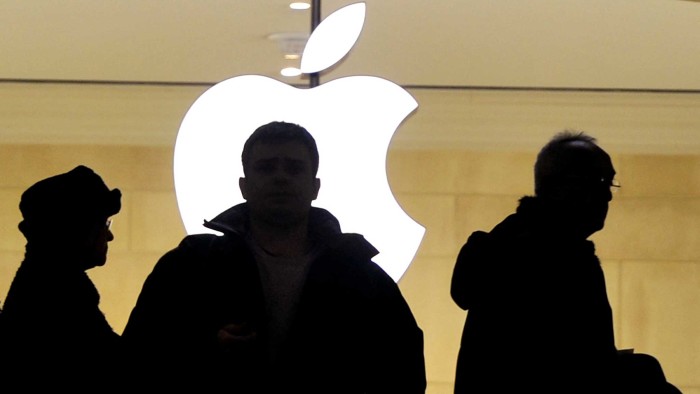Apple battles to regain its product bite

Roula Khalaf, Editor of the FT, selects her favourite stories in this weekly newsletter.
Apple’s share price was just above $200 in late January 2010 when Steve Jobs took to the stage to unveil the iPad. Any investors who bought the stock then and held it since would have almost doubled their money, a better return than investing in any other large US technology company besides Amazon.
Yet the fall of Apple’s share price to below $400 in recent days underlines its loss of momentum. For the first time since the iPad’s launch, this spring has seen no splashy Apple events.
Since the product blitz of last autumn, which saw almost every device upgraded and its stock price peak above $700, Tim Cook, Apple’s chief executive, has apologised more often than he has introduced new innovations.
After expressing regret for the botched launch of its Maps app and for alleged customer-service failures in China, Mr Cook has yet to apologise to shareholders for the nearly $300bn in market value lost since September’s highs.
He has, however, expressed sympathy. “I don’t like it either,” he said of the share price at Apple’s annual meeting in February.
At that meeting, an overwhelming majority of Apple shareholders voted in favour of Mr Cook to remain as chief executive.
But analysts such as Walter Piecyk of BTIG Research say if Apple fails to produce radical new products or turn round its slowing revenue growth within six months, investors may begin to get restless.
“There is no excuse for it – it’s a pretty dramatic change,” he says of the revenue slowdown.
The deceleration is partly due to 2012’s bumper year and the pacing of product launches, which were bunched together towards the end of the year.
But Apple is yet to introduce a new category of device – such as a television, watch or cheaper smartphone – that could remind investors of its innovative abilities.
Speculation that Apple might introduce new devices more frequently this year has also not yet been met, costing Apple both sales growth and marketing buzz.
In 2012, “they owned the news cycle for much of the year … so every time you’d turn around there would be a new Apple product and they would be incredibly engaging,” says Rhoda Alexander, tablet analyst at IHS iSuppli, a market researcher. “It makes no marketing sense to update them all at the one time.”
However, moving to a more frequent product refresh cycle would reduce Apple’s economies of scale and put pressure on margins, at a time when the cheaper iPad mini’s popularity – perhaps accounting for as much as two-thirds of all iPads sold – is already hurting Apple’s overall profit profile.
That is just one reason why investors have resigned themselves to a dismal set of results on Tuesday. Apple’s own guidance suggests quarterly earnings will fall, year-over-year, for the first time in a decade. After being particularly cautious in its guidance in January, another weak outlook for Apple’s June quarter could see the stock fall further still.
“Tim Cook in particular and Apple in general have never given the impression of being a company that puts a lot of effort into smoothing out the quarters,” says Benedict Evans of Enders Analysis. “I don’t think they are going to manage the product cycle in order to deliver a nice flow of financials to Wall Street.”
Although the iPhone continues to dominate the US handset market, the continuing popularity of older models of Apple’s smartphone and its lower market share in faster-growing markets such as China and Brazil has analysts questioning the company’s ability to grow over the longer term.
In a particularly pessimistic note last week, analysts at Barclays slashed their 2014 earnings forecasts by a fifth, from $48.92 to $39.35. Barclays now predicts that iPhone unit sales will grow only 4 per cent over the course of Apple’s current fiscal year, to 133.4m devices. Total revenue growth of 7 per cent to $168.03bn, in the year ending September, will slow to 2 per cent in 2014 and 4 per cent in 2015, Barclays predicts.
Some say that Mr Cook is merely the victim of Apple’s success.
“It’s hard to criticise Tim Cook for having such an enormous share of the market that you can’t get any more,” says Mr Evans of the slowdown.
Nonetheless, the company now faces a turning point unlike any in the past three years.
“The challenge is it’s quite easy to see a ceiling on iPhone growth in the relatively near future,” Mr Evans says. “Meanwhile, we have no idea how big the tablet market is …. There is a real and tangible risk that this is as good as Apple ever gets.”
The next six months will see a crucial test when Apple decides whether to launch a new, low-cost iPhone that could unlock emerging markets and regain market share – but perhaps at the cost to margins and its brand premium. How Mr Cook handles that transition will be critical to shareholder sentiment.
“Investors will give them the benefit of the doubt for the next quarter or so,” says Mr Piecyk. “It’s hard to believe they won’t announce some products between now and October 1. But if they don’t and they aren’t doing obvious stuff to grow revenue and earnings, then you have to start asking whether this is the right management team.”
Comments